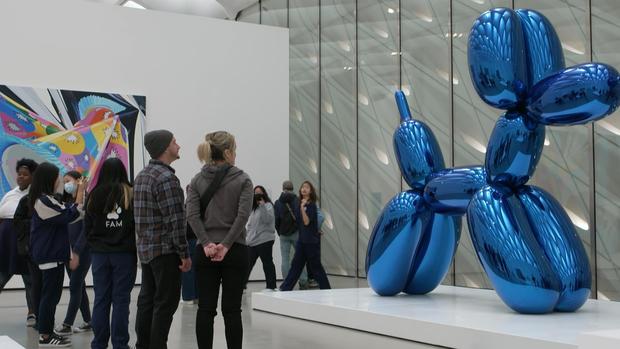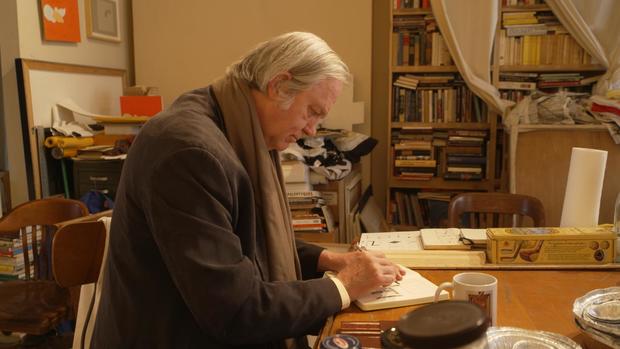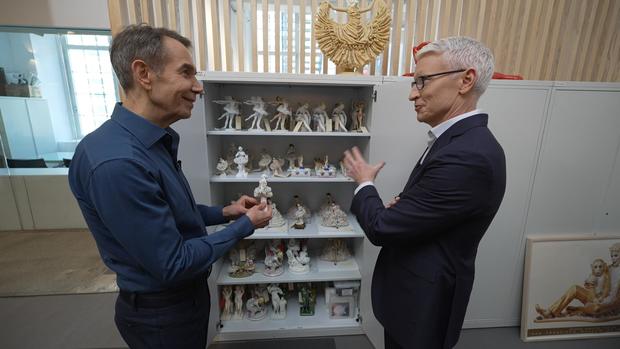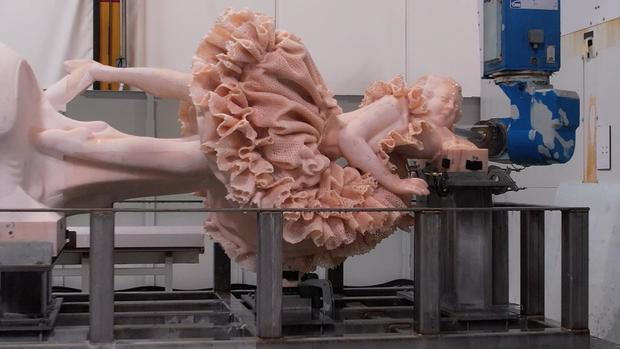Art world giant Jeff Koons explains how his seemingly simple art is actually very complicated to make
Jeff Koons is one of the most prominent and polarizing art stars in the world. Perhaps you’ve seen one of his giant balloon dog sculptures or the stainless steel inflatable rabbit he made that resold for $91 million a few years ago- the highest price ever paid at auction for a work by a living artist. I bought a much less expensive work of his at a charity auction about 10 years ago. His creations may look simple, but they can take decades to make and often push the boundaries of technology and sometimes taste. Critics may scoff at times but that’s nothing new. Jeff Koons has been controversial since he first started showing his art more than 40 years ago.
You’ll find the largest collection of Jeff Koons’ work at the Broad Museum in Los Angeles. Visiting it is like showing up at a strange children’s party long after the kids have gone to bed.
There’s a giant painting of a party hat, a porcelain Michael Jackson and his chimp Bubbles- a kind of pop culture pieta. The Hulk even makes an appearance.
The star attraction- a 10-foot tall, stainless steel “Balloon Dog” sculpture.
Koons showed it to us after hours.
Jeff Koons: We had to make machines to make this work. They didn’t exist.
It may look like it’s filled with air, but “Balloon Dog” weighs more than a ton and took Jeff Koons six years to make.
60 Minutes
Jeff Koons: I started with a balloon and I blew it up. I twisted a balloon dog.
Anderson Cooper: Did you know how to make a balloon dog?
Jeff Koons: No, I just got a little book. And I saw how you do it. So I twisted up. I probably made about 50 of ’em. I made a mold of it. And then that was used to make the stainless steel pieces. You know, originally, when I made this piece, I thought that I could make it for about $300,000. Which still, that’s a lot of money. But it ended up just to create the piece ended up costing me $1.6 [million]
Anderson Cooper: Wow.
Jeff Koons: And that was more than what I had sold the work for.
That’s classic Koons. He is famous for going over budget and his obsessive attention to detail is legendary. He spent 20 years figuring out how to turn this mass of aluminum into a ten-foot tall pile of Play-Doh.
To get these basketballs to appear suspended in air, he enlisted the help of a Nobel prize winning physicist…
…and he used more than 60,000 living flowers to create this 40-foot sculpture of a puppy.
Koons often takes famous characters or artworks and plays with them- adding a gazing ball to the Mona Lisa. Or he elevates everyday things, making them larger, shinier or surreal versions of themselves.
Jeff Koons: The Rabbit’s from ’86.
Anderson Cooper: ’86.
Like that “Rabbit” resold a few years ago for $91 million, he made four that look at first as if they’re just plastic inflatables. But they’re highly polished stainless steel and weigh about 150 pounds.
Jeff Koons: It’s iconic because it can represent so many different things. I can think of Easter. I can think of a politician with a kind of, a microphone, somebody making proclamations. I can think of a Playboy rabbit. But I think one of the most important things to me, the reason it’s reflective, and reflecting you, reflecting me, you know, the viewer finishes a work of art. It’s, it, it’s about your feelings, your experiences. It’s about your potential.
60 Minutes
Maybe you’re thinking Jeff Koons sounds like a phony self-help prophet. Plenty of critics do, but he does see art as something that can help people have a personal transformation.
Jeff Koons: Art can be anything. I mean, it really can be. My personal experience of art is that you just don’t have to bring anything to it other than yourself.
Anderson Cooper: So your message to people is you don’t need to have a thesis in art history to interact with art and what you feel from it is valid.
Jeff Koons: It’s as valid as anybody else could experience.
Anderson Cooper: Why balloon dogs? Why gazing balls? An inflatable rabbit?
Jeff Koons: Memories. You know around Easter time, I would see a lot of inflatable rabbits in the yards. I would see gazing balls in people’s yards, in their gardens. Our neighbors who do that, I mean how generous they are for us that we’re just driving by or walking by, and we can look. And we can have a little awe and wonderment just for that, a second. To me they’re symbols of cultural history.
Koons grew up outside York, Pennsylvania, in a rural community, where you can still find gazing balls in people’s yards. He has eight children, six with his second wife Justine, to whom he’s been married for 21 years. They still live part time in Pennsylvania, in Koons’ grandparents house, part of an 800-acre farm where they raise horses and cows.
Anderson Cooper: I think most people don’t envision that this is the life you have as a world-famous artist.
Jeff Koons: Yeah. Well, you know, you know, I’m very involved with my, my work. But on the weekends and summers, holidays, this is a really important part of my life.
Koons has been drawing and painting since childhood. In 1974 while studying art in college, his mother helped him meet one of his favorite surrealist painters.
Jeff Koons: My mother called me and she said, “I just saw in a magazine that Salvador Dali spends half his year in New York City at the St. Regis Hotel.” And I thought, oh, OK, maybe, you know, I’ll call and, and –
Anderson Cooper: Wait a minute. You just thought you’d call him?
Jeff Koons: I called the St. Regis. I asked for Salvador Dali’s room and they put me through. You know, I was quite nervous, but I told him I was a fan and that I would enjoy very much to meet him. And he said, “Can you come to New York this weekend on Saturday?” And I said yes. He said, “Be in the lobby at 12 o’clock and I’ll meet you then.” And he was spectacular.
Anderson Cooper: It would never have occurred to me to, like, just call Salvador Dali at his hotel room.
Jeff Koons: I had nothing to lose, you know?
Koons and Dali spent the afternoon together, and at the end of it, he asked the world-renowned artist to pose for this picture.
Jeff Koons: I remember he put his mustache up and he was telling me, you know, “Kid, hurry up. I, I can’t hold this pose all day.” But I left New York that evening feeling like I could do this.
After finishing school, he hitchhiked to New York and started making art in his Lower East Side apartment- buying cheap plastic inflatables and putting them on mirrors. Koons had grand ambitions but he needed cash to realize them.
Jeff Koons: So eventually I became licensed and registered to sell commodities and mutual funds. And so, you know, that’s what I started to do to be able to make more money to make the works.
Anderson Cooper: That’s not a career move a lot of artists make.
Jeff Koons: You know, I did it only that I could make enough money to make my vacuum cleaner pieces.
The vacuum cleaners he’s talking about were what first got him noticed in 1980. He bought about 20 brand new vacuums and displayed them in cases with fluorescent lights. It was part of a series called “The New.”
Jeff Koons: I was showing them for their newness, that this was a brand new object, it was never used, never turned on. You can see that it’s clean, it’s pristine, its lungs are pure. And there’s also some sensual aspects to it, too. They can–
Anderson Cooper: Sensual aspects?
Jeff Koons: Sensual, I mean, you have the handle, and you have the bag right there. It could be looked at as masculine, or you can look at it and say, “Oh, you know, the bag is the womb.”
Art definitely is in the eye of the beholder.
Anderson Cooper: What did you think of Jeff Koons as an artist when he first sort of came on the scene?
60 Minutes
Robert Storr: I was interested in him, and I also was kind of repulsed by him.
Robert Storr, former dean at the Yale School of Art, was a curator at the Museum of Modern Art in New York when it acquired some of Koons’ vacuums in 1996.
Robert Storr: I think some of the work is really unpleasant. But it doesn’t mean it’s not serious.
Anderson Cooper: What’s unpleasant about it?
Robert Storr: The imagery is, is vulgar, okay? Now, vulgar means many things. It means of the people rather than of the elites.
Anderson Cooper: So it’s taking an object which the New York elites might look at and think, “Oh, that’s tacky. That’s”–
Robert Storr: Yeah–
Anderson Cooper: “That’s trashy. That’s something you buy in, in a gift shop.” And it’s blowing it up and making it perfect and saying that this has value?
Robert Storr: It has meaning, not necessarily value, but it has meaning.
Anderson Cooper: What is the message of that?
Robert Storr: The message is that it is there to be embraced, that it is not to be mocked, that one should not be smugly sure of one’s own taste to the point of denying the possibility of other tastes.
Anderson Cooper: And is he being honest about that?
Robert Storr: I think he’s being totally honest. And I think that he has made all of that fair game in a way that we have not seen since Warhol.
Like Andy Warhol, Jeff Koons has a factory of sorts. With an assembly line of painters meticulously following his instructions, and dozens of digital assistants, sculptors, and craftsmen all over the world helping make his complex pieces, which are often inspired by very simple things.
Anderson Cooper: This is like a very modern grandmother’s closet.
60 Minutes
Turns out Koons was fascinated by his grandparent’s porcelain figurines as a child and has collected hundreds of them.
Anderson Cooper: Where did you find this?
Jeff Koons: I found it online.
He decided to make this $150 ballerina into a multimillion dollar 8-foot-tall marble sculpture, but it wound up taking him 12 years.
First he used a CAT scan machine to digitally map every detail of the figurine inside and out.
Then it took him five years, and the help of MIT scientists, to begin translating all those details into instructions for machines to carve the sculpture.
The actual carving took another seven years.
We went with Koons to a workshop in Pennsylvania to check on the progress, and found Ayami Aoyama and her team carefully polishing the ballerina by hand.
Anderson Cooper: Do you have a sense of how many hours of work is done on a piece?
Ayami Aoyama: 33,000 hours.
Anderson Cooper: 33,000 hours?
Ayami Aoyama: Hours. For just the handwork.
Anderson Cooper: It must be exhausting. I mean, the level of detail and monotony and difficulty of it is incredible.
Ayami Aoyama: Yeah, it is like really unique job I would say.
Anderson Cooper: That looks like a sort of a dental tool. What, what is this?
Ayami Aoyama: Yeah, that’s nail polisher that, you know, that ladies actually use.
Anderson Cooper: Is it? Really?
Ayami Aoyama: Yeah.
60 Minutes
You’ll notice Jeff Koons isn’t doing the sculpting or painting. He comes up with the ideas and sets the standards, but his artisans do the labor, which has led to criticism- including from our own Morley Safer.
Thirty years ago, Morley did a story critiquing contemporary art and likened Koons to a P.T. Barnum selling to suckers.
Morley Safer (archives): “He doesn’t actually paint or sculpt, he commissions craftsman to do that or he goes shopping for basketballs and vacuum cleaners.”
Anderson Cooper: Is that a legitimate criticism?
Jeff Koons: It’s a legitimate criticism if you look at art in a way that you’re kind of want everything to be done by the artist themselves. But it becomes very limited, what you can do within one life if you’re being responsible for everything. It’s like the production of this program right now. Anderson, if you had to be responsible for the lighting, if you had to be responsible for editing.
Anderson Cooper: If I was responsible for the lighting, you wouldn’t, we wouldn’t see you or myself.
Jeff Koons: But if you’d have to be responsible for everything, I mean, how many programs would you be able to create? I’ve designed, worked on the systems so that the whole process, at the end of the day, it’s as if every mark was made by myself.
At 68, Koons has reached a level of commercial success few artists ever imagine. He’s helped design cars for BMW, an album cover for Lady Gaga, even a superyacht.
And later this year, he hopes to create a permanent art exhibit on the moon. He’s made 125 small stainless steel moon sculptures and mounted them on a lunar lander that’ll hitch a ride aboard a SpaceX rocket.
Anderson Cooper: Is there something about the atmosphere on the moon that would affect the lifespan of a work?
Jeff Koons: Yeah. Almost everything. You know, you have tremendous radiation. You have the temperature change, at least 250 degrees difference from night to day. One of the most inhospitable environments that, you know, you could imagine for a work of art.
The moon sculptures are for sale, of course, along with an NFT, or non-fungible token, which serves as digital proof your artwork is actually up there. You’ll also get one of these larger moons to show off here on Earth. He won’t say how much it’ll cost you, but with Jeff Koons it’s a safe bet the price tag will be out of this world.
Produced by Nichole Marks. Associate producers: John Gallen, David M. Levine and Katie Kerbstat Jacobson. Broadcast associates: Eliza Costas and Annabelle Hanflig. Edited by Michael Mongulla.
For all the latest Entertainment News Click Here
For the latest news and updates, follow us on Google News.







